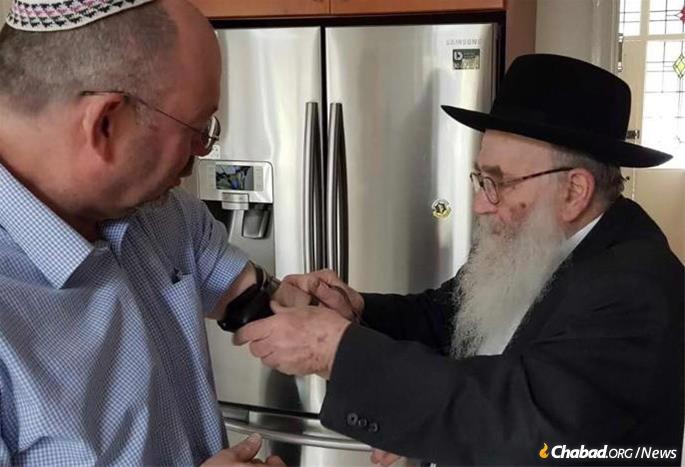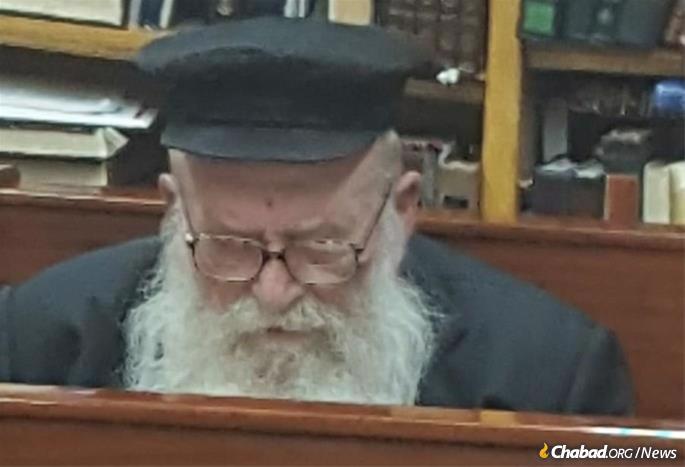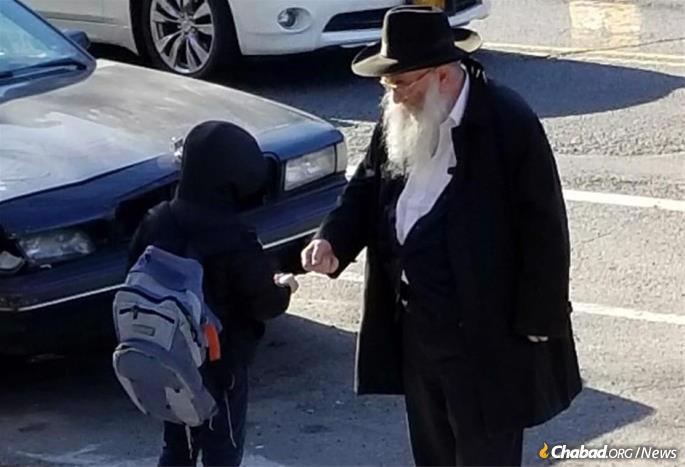Mordechai Chein, a printer by trade whose ceaseless Chassidic dedication turned him into a communal mentor and activist by example, passed away on March 31 from COVID-19-related complications. He was 81 years old.
Reb Mottel, as he was affectionately known, viewed every moment as an opportunity to help another person, physically or spiritually. Whether laying tefillin with a fellow Jew, putting up a mezuzah on someone’s door or simply encouraging another with a smile and a kind word, he was a man always on the move. Although Reb Mottel never held an official rabbinic position, he saw himself as a foot soldier in the mission of the Rebbe—Rabbi Menachem M Schneerson, of righteous memory—of spreading Judaism to every Jew.
And he did it all with a certain charm, a mischievous wink. Like the time, almost 20 years ago, when he was driving one of his sons for physical therapy at a Manhattan hospital. Sitting in the car or waiting room for the duration of his son’s hour-long session wouldn’t cut it for the irrepressible Chassid, who instead grabbed his tefillin and headed for a nearby JCC-like complex. In his Russian-Yiddish tinged accent, Reb Mottel began asking men whether they were Jewish and would like to put on tefillin, but soon staff approached and delivered a fatal blow to his endeavor: the space was for members only. Without missing a beat, he pulled out his wallet and purchased himself a gym membership. With his card in hand, Reb Mottel would return to the center with his tefillin every week for the next two decades.
Mordechai Leib Chein was born on Nov. 4, 1938, in Leningrad, in the Soviet Union, a descendent of a long lineage of prominent Torah scholars and renowned Chassidim dating back to the days of the founder of the Chabad-Lubavitch movement, Rabbi Shneur Zalman of Liadi. His parents, Reb Berke (Dovber) and Faiga Chein, were prominent Chassidic figures in their own right. Even now, stories are told in Chabad circles of Berke Chein’s self-sacrifice to teach Torah during the years of Soviet oppression. Reb Berke’s fiery prayers, devotion to the Rebbe and steadfast humility acquired a name for him as one of the foremost Chassidic mentors of his time and were traits deeply ingrained in his son.
Mottel Chein’s early years were spent on the run, the family heading from Leningrad to Samarkand, Soviet Uzbekistan, to escape the Nazi onslaught. In Samarkand his father taught in an underground cheder, and Reb Mottel would later recall being posted at the age of 6 as a lookout to warn his father and the class whether Soviet police or secret police were approaching. The code word, he would remember forever, was knepl, or “button” in Yiddish, to signify the uniform representing Soviet authority.
In 1946, the Cheins, like many other Lubavitcher Chassidim, headed to Lvov, Ukraine, on the Soviet border, hoping to obtain false Polish identity papers and escape to the West. While this dangerous plan worked for more than 1,000 Lubavitchers, young Mottel’s father, Reb Berke, who was helping to lead the effort, was arrested in the city. With their father in MGB (later KGB) hands, the Cheins moved in with their grandparents, Schneur Zalman and Menucha Kalmanson.

One day while their mother was out on errands, a taxi pulled up at the Kalmenson home and out came Sara Katzenelenbogen, another one of the individuals behind the massive and coordinated escape effort (who would later herself be arrested and perish in a Soviet prison). The window was narrowing, she said. There was a train to freedom leaving in a short amount of time. Telling the Kalmansons that there was not a minute to spare, Katzenelenbogen took Mottel and his brother and brought them to the train station. The two boys boarded the train with a few dozen other Chassidim and left Russia forever. Their father would go on to serve a number of years in Soviet prisons and then spend years in hiding living under an assumed name, while their mother and sister awaited his return.
Hundreds of miles from both of his parents, the 7-year-old Mottel first lived in Paris with relatives. A few years later, with the blessing of the Sixth Rebbe—Rabbi Yosef Yitzchak Schneerson, of righteous memory—he and his brother left for Israel to live with their grandparents, who had also escaped Russia by that point.
In the late 1950s, after the passing of Rabbi Yosef Yitzchak and the succession of his son-in-law, the Rebbe, Reb Mottel traveled to New York to study at 770 Eastern Parkway, Chabad World Headquarters in Brooklyn, N.Y. After a year of rigorous study, he was granted permission to stay for a second year, unusual for those who traveled from Israel. For all practical purposes an orphan during his parents’ lifetime, Reb Mottel was shown special attention by the Rebbe, who personally assisted him with his finances.

In 1960, the young man was witness to an open miracle when the Rebbe promised him that the Soviets, despite blacklisting his father, would allow him to leave the Soviet Union. Indeed, the senior Cheins and their daughter were granted permission to leave and finally reunited with their sons after 14 years of being apart.
In 1962, Reb Mottel married his wife, Bracha. During the Shabbat both before and after the wedding, the Rebbe mentioned the celebration during the farbrengen, instructing those assembled to say “l’chaim” for those who remained locked inside Soviet Russia.

‘A Man Who Lived for His Ideals’
After his marriage, Reb Mottel wished to join the Rebbe's growing network of emissaries. When he was offered a position in London, he wrote to the Rebbe asking whether this was something he should pursue. Shortly thereafter he received a call from the chief of the Rebbe's secretariat, Rabbi Chaim Mordechai Aizik Hodakov, who told the young man that the Chabad movement needed its own printer. The Rebbe had since even before his assumption of leadership placed a heavy emphasis on preparing and printing both classic Jewish texts and Chassidic texts, some for the first time ever. But the Jewish publication revolution the Rebbe was precipitating was still just at its beginning.
At the advice of the Rebbe, as a yeshivah student Reb Mottel had apprenticed at the printing press of Rabbi Mordechai Shusterman. Now, he was being enlisted to utilize these skills for world Jewry, and Reb Mottel saw that this work would be his particular "shlichut," his mission. He and his wife settled permanently in the Crown Heights neighborhood of Brooklyn, N.Y., where he would eventually become an indelible fixture, and printing became his life-long trade—first as a worker, and later as founder and partner of Empire Press. Reb Mottel utilized his capacity to produce innumerable works of Chassidus, including the weekly talks of the Rebbe and many rush projects that the Rebbe requested on urgent deadlines. Among his customers, it was known that if a request from the Rebbe came in, all other work was halted until it was completed.
As a devout follower of the Rebbe, Reb Mottel did not need an official position to spread Judaism to a fellow Jew. From when the Rebbe encouraged his followers to give others the chance to put on tefillin, Reb Mottel would utilize every opportunity to do so. A plane ride, a business meeting or a busy doctor’s office were all seen as opportunities to connect a Jew to his Father in Heaven.

“My father once visited a doctor for a checkup,” said Rabbi Shloime Chein, co-director of Chabad at the University of California in S. Cruz, Calif. “In passing, the doctor told my father that he really needs to stop smoking. Without missing a beat, my father responded, with a twinkle in his eye, that the doctor ‘really needs to start putting on tefillin.’ ”
“The doctor, not believing that a decades-long smoker could quit, promised that he would begin putting on tefillin daily if my father kept his half of the deal. From that day, my father didn’t touch another cigarette. This was after numerous unsuccessful attempts to quit, but the chance to get someone to lay tefillin gave him the strength to kick the habit.”
A similar pattern played out with all of the Rebbe’s mitzvah campaigns. Whether by offering a mezuzah to one who didn’t have, shmurah matzah before Passover or blowing shofar on Rosh Hashanah, Reb Mottel always saw every encounter as an opportunity. From when the Rebbe instituted the daily study of Maimonides’ Mishneh Torah, he made sure to join a class and study the daily portion. And when the Rebbe spoke strongly about the coming of Moshiach, Reb Mottel took it to heart, changing his perspective to always be preparing for the time of ultimate good.

“My father was a printer by trade, but his life was being a Chassid,” added his son, Rabbi Shlomie Chein. “Picturing his constant learning, the way he prayed or the way he helped so many people and institutions without fanfare, the only conclusion one can reach is that this was a man who lived for his ideals.”
He is survived by his wife, Bracha, and their children: Yossi Chein (Brooklyn, N.Y.); Raizel Shemtov (Toledo, Ohio); Pinny Chein (Argentina); Chana Eidelman (Vienna, Austria); Mendel Chein (Brooklyn, N.Y.); Peretz Chein (Cheadle, England); Moshe Chein (Toulouse, France); Shloime Chein (S. Cruz, Calif.); Zalman Chein (Binghamton, N.Y.); as well as many grandchildren and great-grandchildren.











Join the Discussion